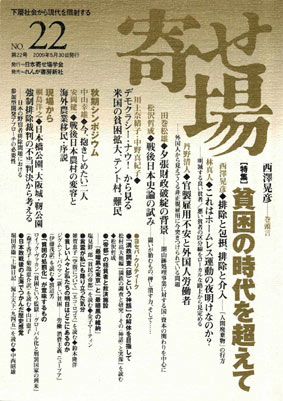|
|
|
|
|
|
|
|
|
日本寄せ場学会年報 No.13 No.14 発売元: |
『寄せ場』No.22(2009.5.)
「巻頭言」西澤晃彦 特集:貧困の時代を超えて 秋期シンポジウム 現場から ヨセバ・クリティーク 学会日録 2008.5〜2009.4 Table of Contents Yoseba Annual 22 Introductory comments * Special Feature: Overcoming an Era of Poverty NISHIZAWA Akihiko, 'Exclusion and Absorption, Exclusion and Introduction: What Becomes of 'Human waste'.” HAYASHI Mahito, 'Is this a new dawn for the homeless movement? Assessing the wavering distinction between the “good poor” and “bad poor” from local street level.' TANNO Kiyoto, 'Government-created employment insecurity and foreign workers: the urgent problems confronting irregular employment as seen from a foreigner's perspective.' TAMAKI Matsuo, 'The background to the financial collapse of the city of Yubari: Focusing on the involvement of the state and private capital in settling affairs after the closure of the mines.' MATSUZAWA Tessei, 'Attempting to theorize postwar Japanese history: the fruits of struggle, the power to oppress.' KAWAKAMI Naoko, NAKANO Makiko, 'A look at the expansion of poverty and tent city refugees in the United States, as seen from the perspective of “Democracy Now!”' * Proceedings of the Autumn Symposium NAKAYAMA Yukio, 'Two People I would like to hug.' YASUOKA Ken'ichi, 'Preliminary thoughts on postwar Japanese villages and overseas migration of agricultural workers.' * Notes from the frontline TSUNASHIMA Hiroyuki, 'Thoughts on the unjust verdict handed down on the forced expulsions from Nipponbashi Park, Osaka Castle Park and Utsubo Park: on the need for a participatory developmental approach to the problem of exclusion of Japan's homeless people.' * Yoseba Critique MATSUZAWA Tessei, 'Trying to dissect the myth of the Manchurian Railway Survey Department: A reading of Takao Matsumura's edited collection, Surveys and Research by the Manchurian Railway Company ? the Myth and the True Picture' Martin KANEKO, 'The very poor in imperial capitals and facilities for their relief: “Darkest Tokyo” and “Darkest Vienna”: A reading of Shiomi Sen'ichiro's Imperial Capitals of the Poor' SUZUKI Takahiro, 'The feeling that the spirit of language had come down to me: a reading of Saiga Keiko's On Hunger and Eco/Logos' WATANABE Kaoru, 'Where is tomorrow for the poor and ourselves? A reading of Sigmund Bauman's New Poverty: Labor, Consumerism and the New Poor' (translated by Ito Shigeru) YAMAGUCHI Keiko, 'Essential reading with the harsh gaze now directed at the street: A reading of Loic Wacquant's A Prison called Poverty: Globalization and the Coming of the Punitive State (translated by Mori Chikako and Kikuchi Keisuke) NAKANISHI Teruo, 'The sense of history grasped at Shanghai after Japan's defeat in World War II: A reading of Hotta Yoshie's Shanghai Diary: Kojo Tenka 1945' |
